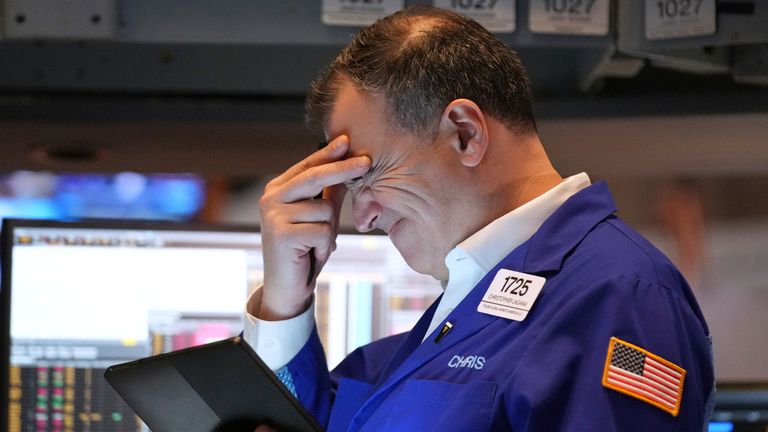Stock Markets Plummet Following Donald Trump’s Announcement of Sweeping Tariffs | US News
Global stock markets experienced a steep decline following Donald Trump’s announcement of extensive tariffs, sparking concerns among economists about a potential recession.
The US president unveiled tariffs affecting nearly all countries, including a 10% tariff on imports from the UK and a flat 25% on all imported vehicles, during an announcement on Wednesday night that sent financial markets into turmoil.
As of 5:30 PM, the UK’s FTSE 100 had fallen by 1.55%, while the continental STOXX Europe 600 index dropped 2.67%, with American traders facing even greater losses.
Latest on Trump tariffs: US stock markets decline sharply
All three major US markets opened with significant losses on Thursday morning.
By 8:30 PM UK time (3:30 PM EST), the Dow Jones Industrial Average had dropped 3.7%, the S&P 500 had fallen by 4.4%, indicating it could be headed for its worst day since the onset of the COVID-19 pandemic, while the NASDAQ composite lost 5.6%.
Compared to their values at the time of Trump’s inauguration, the three markets were approximately down by 5.6%, 8.7%, and 14.4% respectively, as reported by LSEG.
In light of the market’s reaction, White House press secretary Karoline Leavitt mentioned to CNN that President Trump “is reaffirming his successful economic approach from his first term.”
“To those on Wall Street this morning, I would advise to place your trust in President Trump,” she stated, adding, “This truly is a national emergency… and it’s about time we have a president who takes action.”
The market upheaval caused by Trump’s tariffs “has left everyone stunned,” remarked Garrett Melson, portfolio strategist at Natixis Investment Managers Solutions in Boston, to Reuters.
He cautioned that the economy might slide into recession, noting that “the most intense repercussions will likely be felt in the US, which will inevitably impact global growth.”
Meanwhile, Justin Onuekwusi, chief investment officer at St James’s Place, indicated that international retaliation is likely, emphasizing that “it is apparent that countries will carefully consider politically savvy ways to retaliate.”
He cautioned: “Significant retaliation could trigger a tariff ‘spiral of doom’ that might be the economic shock that leads us into recession.”
Read more:
Do Trump’s ‘Liberation Day’ tariff figures hold up?
Tariffs driven by factors beyond economics: power
In addition, the UK government has released a longlist of US goods that may face reciprocal tariffs, including golf clubs and golf balls.
This list spans over 400 pages and is part of a four-week consultation with British businesses, proposing tariffs on items such as whiskey, jeans, livestock, and chemical components.
Sir Keir Starmer remarked on Thursday that the US president has initiated a “new era” in global trade, pledging that the UK will approach the situation with “level-headedness.”
Moreover, Canadian Prime Minister Mark Carney declared a 25% tariff on all American vehicles that do not comply with the US-Mexico-Canada trade agreement.
He stated, “The 80-year era during which the United States embraced global economic leadership, forming alliances based on trust and mutual respect and advocating for the free exchange of goods and services, has come to an end. This is a tragedy.”





